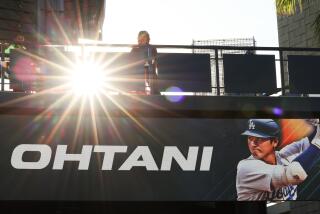Baseball Stations Fall Behind in Count
As baseball club owners and striking players struggle for the upper hand in their 8-month-old dispute, broadcasters whose lifeblood is baseball advertising say it matters not who wins or loses, itâs how soon they play the game.
âIf they settle now, this goes from being a disaster to a reasonable beating,â said Jim Kalmenson, general manager of Los Angeles radio station KWKW-AM, whose Spanish-language Dodger broadcasts are so popular they are carried by 40 stations in Mexico.
For nine straight years, KWKWâs full slate of advertising slots for Dodger games has been sold out well before Opening Day, sometimes by mid-January.
Not this season.
At KWKW, as at radio and TV stations across the country, advertisers have stepped out of the batterâs box, fearful that replacement-player baseball will not draw audiences or that it is risky to associate their products with a sport getting so much negative publicity.
With the Freeway Series--the traditional conclusion of the exhibition season for the Dodgers and Angels--starting in Anaheim tonight, less than half of KWKWâs slate has been sold.
Itâs a situation repeated to a greater or lesser extent at KABC-AM and KMPC-AM, the stations that carry the Dodger and Angel English-language radio broadcasts; KTLA-Channel 5, the television flagship of both the Dodgers and the Angels, and Prime Sports, the cable network slated to carry 26 Angels games.
âPeople who say theyâre getting ad dollars are, one, lying, or two, offering unheard of concessions,â one local broadcaster said.
If the striking players return to the field--and both sides have made conciliatory noises this week--demand for ad slots will quickly firm up, experts said. But a lot of damage has already been done.
Indeed, the âspotâ or cash market for television ads on local baseball broadcasts has all but dried up as many advertisers, who commit to budgets on a quarterly basis, have spent their money elsewhere for April through June. That is a tough blow for local TV, because spot advertising commands higher rates than time scheduled as part of long-term sponsorship packages.
âThe incremental dollars have come to a halt. Weâre not getting any spot business,â said John Reardon, station manager of Channel 5.
Adds Jerry Solomon of SFM Media Corp. in New York, major buyers of broadcast time for advertisers: âIf you havenât already committed your money for April, you know that you can drive a truck through the stationâs schedule and youâre going to negotiate a much lower rate.â
Among the national networks, the situation is not yet so dire. The Baseball Network, a joint venture of NBC, ABC and Major League Baseball, is not scheduled to begin its season of prime-time games until the All-Star game in July. Locally, Prime Sports, with some scheduling flexibility under its contract, has pushed back its first Angels broadcast to mid-June.
Among the balky big-time advertisers:
* Texaco, sponsor of baseballâs annual All-Star voting, has canceled plans to distribute millions of ballots at its service stations, opting to make a much reduced number available at ballparks only. The concern is that in place of Barry Bonds, Ken Griffey Jr. and Mike Piazza, the All-Star squads may be filled with unknowns.
* Gillette Co., the Boston-based razor blade giant that has been advertising on baseball broadcasts since the 1939 World Series, is considering pulling the plug on âThe Strike Zone Challenge,â a fan-participation contest planned as its main baseball-related promotion this season.
* The California Lottery has earmarked about $2 million--nearly 10% of its annual media budget--for TV broadcasts of the stateâs five Major League teams, but it will not spend the money on replacement-player games. âItâs too risky. We donât know what the ratings would be,â advertising director Susan Kossack said.
Major League ballclubs traditionally refer to the TV and radio stations that carry their games as âour broadcast partners,â implying a warm bond of shared interest.
However, the veneer of loyalty is wearing thin.
In New York, for example, WABC-AM radio filed a $10-million lawsuit against the Yankees two weeks ago to recoup the stationâs expected strike losses. Replacement-player games are worthless, WABC argued in its court complaint, because âvirtually no advertisersâ will buy time on the broadcasts.
The MSG Network, the cable-TV carrier that pays about $45 million a year for the rights to air Yankees games--the highest local rights fee in all of pro spots--refused to air replacement-player exhibition games because the team wouldnât provide a price break. MSG said that 95% of its baseball advertising has evaporated.
At KABC radio, general manager George Green blames part of the advertising sales slump on other media, including The Times and other newspapers, which have sharply reduced their coverage of contests featuring replacement players.
But by making significant ticket-price concessions, the teams themselves have acknowledged that games without striking stars are an inferior product. All tickets for the Angelsâ home opener next Wednesday against the Milwaukee Brewers, for example, are $1, except for season-ticket holders, who get in free.
At KWKW, Kalmenson sells baseball advertising packages for 192 exhibition and regular-season games. Even if the strike gets settled this weekend and the full, 162-game regular season is played, the stationâs string of nine straight years of revenue growth in baseball advertising will be broken because the exhibition games were essentially wasted.
âIf we could get back to 75% of last year, weâd have a big party,â Kalmenson said.
More to Read
Go beyond the scoreboard
Get the latest on L.A.'s teams in the daily Sports Report newsletter.
You may occasionally receive promotional content from the Los Angeles Times.






